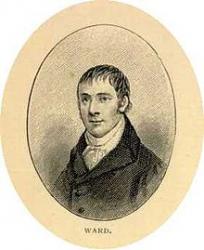Planning worship?
Check out our sister site, ZeteoSearch.org,
for 20+ additional resources related to your search.
- |
User Links
Browse People
William Ward

1769 - 1823 Author of "Great God, thy tender love has sent" Ward, William, p. 453, ii., b. in Derby, 1769, and d. in India, 1821.
--John Julian, Dictionary of Hymnology, Appendix, Part II (1907)
William Ward
Ralph Wardlaw

1779 - 1853 Author of "Christ, of All My Hopes the Ground" in Trinity Hymnal (Rev. ed.) Wardlaw, Ralph, D.D. This venerable and (in his generation) influential Scottish divine contributed twelve hymns to the praise of the Church Universal that are likely to live in a humble and useful way. As having so done, and besides edited several collections of hymns, he claims a place of honour in this work. Critically, and regarded as literature, his hymns have little of poetry in them; no "winged words" to lift the soul heavenward. They reflect simply and plainly the lights and shadows of everyday experiences of the spiritual life, rather than its etherialities and subtleties. His "Lift up to God the voice of praise " is the most widely known; and there is a certain inspiriting clangour about it when well sung; yet it is commonplace. His "Hail morning, known among the blest," is narrative and prosaic, though it filled a gap at the time in Sabbath morning worship. “At the time by God appointed," "Remember Thee! remember Christ!" and "Contemplate, saints, the source divine," have vanishing gleams of imaginative light and fine and tender emotion. "O how good the hallowed union," "Where the sounds of plaintive wailing," and "See the Sun of truth arise," are melodious and singable, and pleasant but shallow. “Christ of all my hopes the ground," (Pt. ii.) "When with wasting sickness worn," is much too long, but is a fairly good song of Zion. Wardlaw published in 1803 a Selection of Hymns, to displace what was called The Tabernacle Collection, 1800, that had been used by the Congregationalists of Scotland, and to which he contributed a few hymns. He was assisted in the preparation of this compilation by Dr. Charles Stuart, of Dunearn. The first edition contained 322 hymns. In 1817 a Supplement was added of 171, bringing up the number to 493. Of these eleven (or twelve strictly) were by Wardlaw. Two of these had previously appeared in the Scottish Missionary Magazine (vol. viii. 48). His hymns bear so very slight a proportion to Dr. Wardlaw's writings as a profound theologian and expositor and thoroughly-equipped controversialist on the chief problems of the period, as to make it necessary to refer the reader to his remarkable Life, by the Rev. Dr. W. L. Alexander, entitled, Memoirs of the Life and Writings of Ralph Wardlaw, D.D. (2nd ed., 1856).
Wardlaw was born at Dalkeith on December 22, 1779, where he received his early education, later attending Glasgow University. His only church was in Glasgow. He died at Easterhouse near Glasgow on Dec. 17, 1853, and his public funeral is still remembered for the representative character of the vast multitude who attended it. [Rev. A. B. Grosart, D.D., LL.D.]
Of Dr. Wardlaw's hymns the following are still in common use:—
1. Glad when they saw the Lord. Easter.
2. Hail, morning known amongst the blest [saints]. Sunday Morning.
3. Lift up to God the voice of praise. Praise to the Father.
4. 0 Lord our God, arise. Missions.
5. Remember Thee, remember Christ. Holy Communion.
6. See the Sun of Truth arise. Christ the Light.
Of these Nos. 3-5 appeared in the Tabernacle Collection, 1800.
-- John Julian, Dictionary of Hymnology (1907)
=============
Wardlaw, R., p. 1232, ii. Of his hymns, Nos. 1, 2 are in his Selection, 1803, and No. 6 was added in the Supplement of 1817. This Supplement also contains "O how good the hallowed union," and "Whence the sounds of plaintive wailing," p. 1232, ii.
--John Julian, Dictionary of Hymnology, New Supplement (1907)
Ralph Wardlaw


 My Starred Hymns
My Starred Hymns


